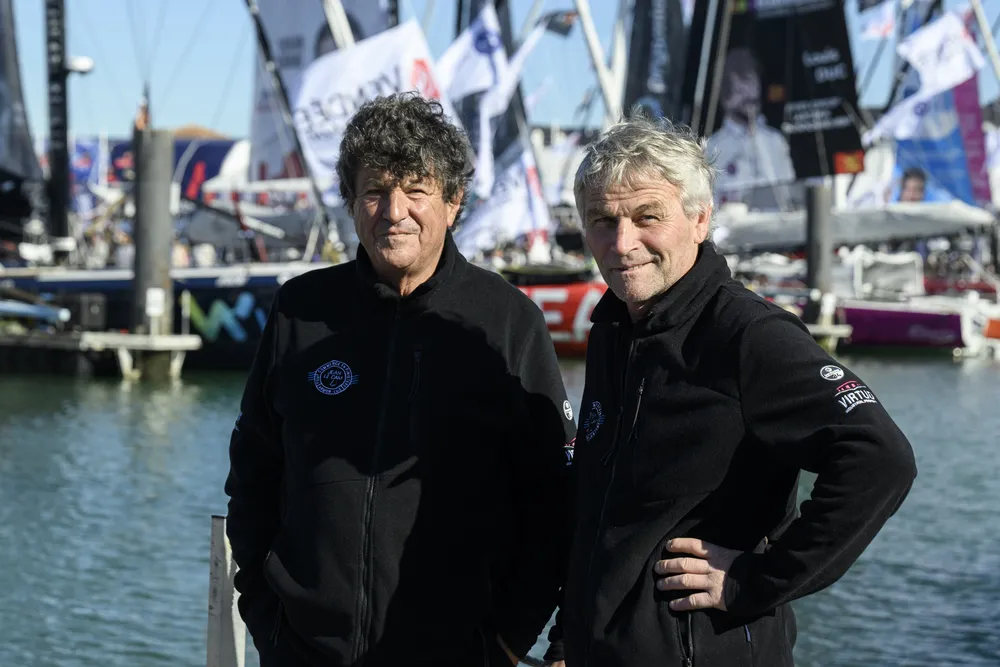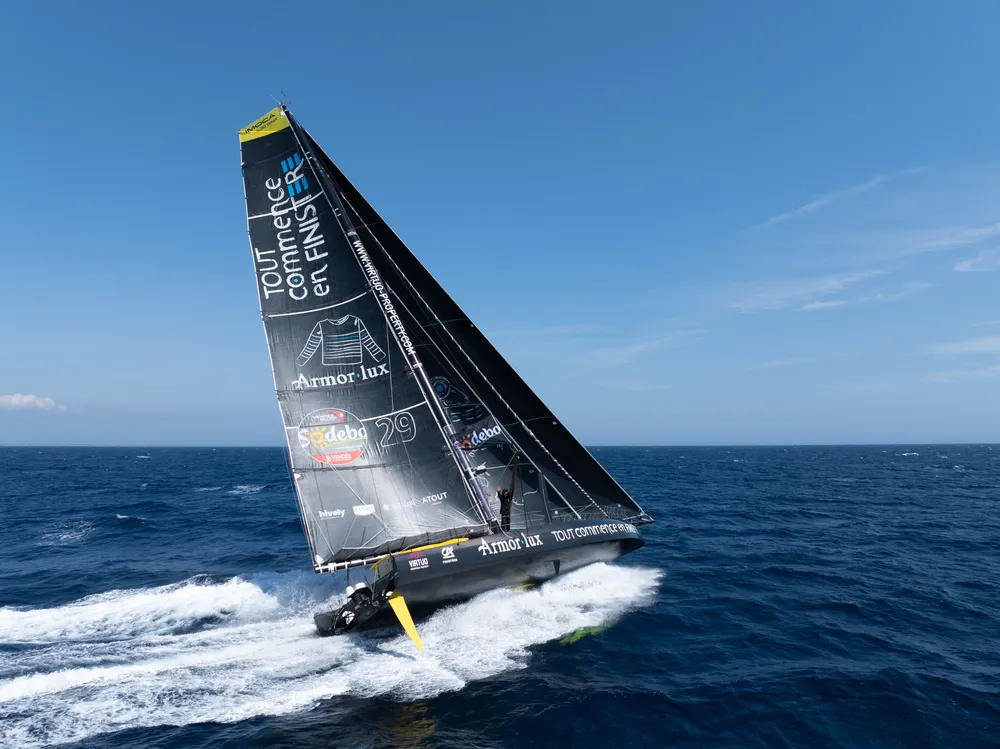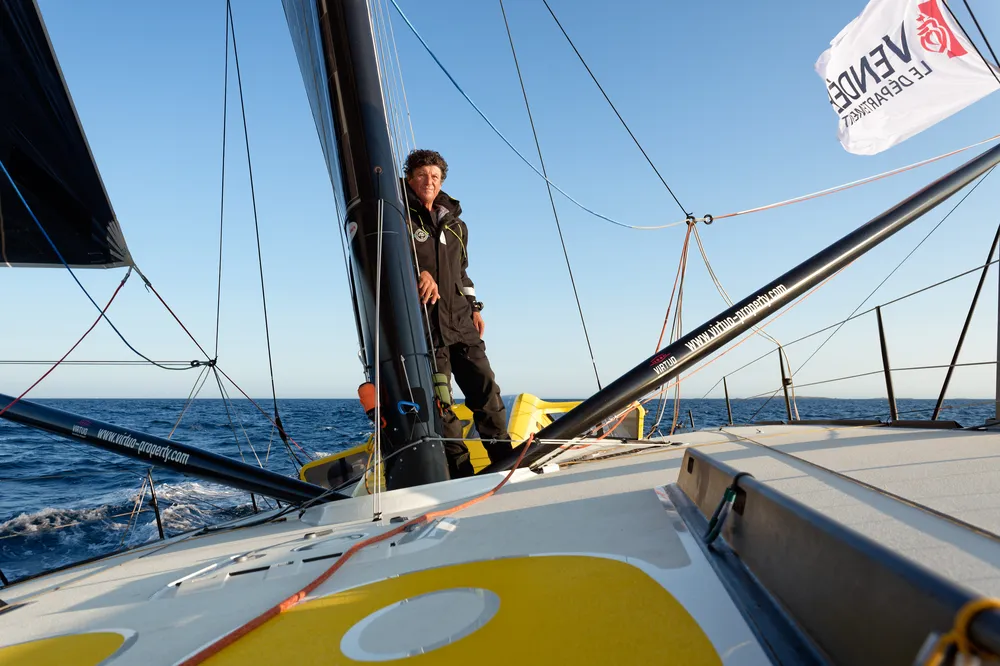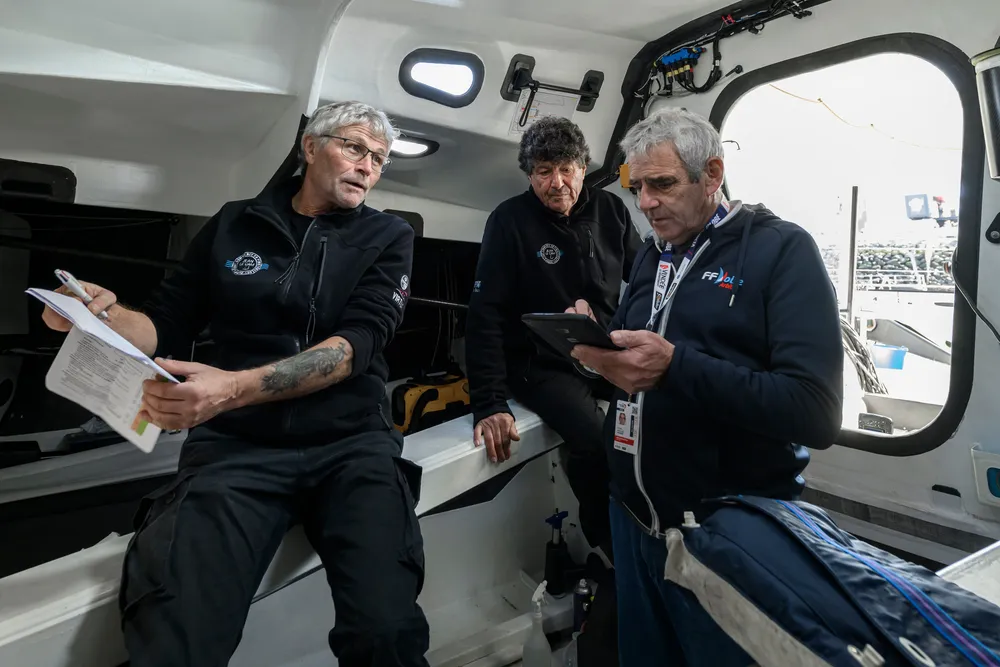Although he has not been at the helm of a solo IMOCA since the loss of his boat in 2013, Bernard Stamm is still very close to circumnavigator circles. He accompanied ocean racing giant Jean Le Cam during his preparation and even accepted the role of deputy. Bernard Stamm didn’t have to take the start of this edition, but at 60, he’s not closing the door on new sporting projects.
“I don’t say no to anything, but I don’t run towards projects, I let them come. “
How did your association with Jean Le Cam for this Vendée Globe come about and what is your role in his team?
Last year, Jean offered me the chance to be his replacement for the Vendée Globe, should he be unable to take the start. This meant preparing like he did, getting to know the boat like he did, and therefore sailing the miles with him. Last year, in parallel with the Jacques Vabre, we sailed together to Martinique so that he could complete his race qualification on the Return to Base. When I came back at the end of November, I was in charge of organizing the Fêtes Maritimes de Brest until August this year. After this long interlude, I once again supported Jean in his final stretch. In particular, I managed his team, relieving him of many time-consuming tasks. I helped him plan the equipment, prepare the boat and sail the various races. As a former Vendée competitor, I also brought a different perspective from the rest of his team.
Having analysed the performance of Jean’s boat and sailed a transatlantic race aboard it, do you think this new daggerboard boat is capable of competing with the foilers?
At certain speeds, of course not. The foilers go a quarter faster, it’s night and day. The architectural choice was made to perform on a full circumnavigation.
Is this a boat built to accelerate in the Southern Ocean, and what advantages does it have over foilers?
It will never accelerate as fast as a foiler, but let’s keep in mind that skippers aboard foilers will find it difficult to use their foils when sea conditions get worse. At the root of Jean’s project is a desire for sobriety and to be competitive at lower cost. Some people look at daggerboard boats as old-fashioned, but our David Raison design can already reach incredible speeds, and unlike foilers, we don’t have to learn to brake. If the latter find themselves behind a low-pressure system with cross seas, they’ll have to retract their appendages as far as possible. But the latest-generation foils are huge, and a substantial part of them remains submerged. The power is there, and they have to manage it. Even if they’ve learned a lot from their experiences in The Ocean Race, in certain sea configurations, it gets really complicated with foils.

©Olivier Blanche

©Eneour Lost
And yet, it doesn’t seem as if the leading group had to apply the brakes during the descent of the Atlantic? What did you retain from this first part of the race?
They had no reason to ease off. They had very mild conditions from the start, then headed down towards Good Hope, staying in the warm sector of the low-pressure system where there is no sea. The Vendée Globe is above all a race of elimination. Either you get through and manage the machine’s efforts, or you break.
Overall, the hierarchy on paper is respected. They all had manageable weather, apart from some squalls that had to be negotiated. On the whole, the weather kept the boats in good shape.
You have an eventful history with the Vendée Globe. Does your involvement with Jean Le Cam’s team rekindle your passion for the race?
It certainly makes you want to do it. I’m a pragmatist, a Globe takes four years to prepare. I watched them leave with envy, but I was aware that this time it wasn’t for me. I don’t know if I’ll ever do it again. When Jean asked me to be his replacement, I had no desire to take his place, because I know what it means to run a Vendée campaign for four years. It’s his project, and I was happy that he could take the start. Since my IMOCA broke in two, I’ve been involved in a lot of great projects: record-breaking with Francis (Joyon Editor’s note), sailing in the Far North with Mike (Horn Editor’s note) and, of course, the Fêtes Maritimes de Brest, which required more energy than an entire Vendée Globe! To tell the truth, I’m a bit tired of having to sell myself. I don’t say no to anything, but I don’t run to projects, I let them come.


©Olivier Blanche
What is your fondest memory of this competition?
This is my arrival in Les Sables in 2012. I was downgraded, because a guy had boarded my boat without my permission when I was anchored near an island south of New Zealand. But the finish was magical. After so much touring, you think it’s normal, but a round-the-world race is still a round-the-world race.
What do you think of the Swiss sailors in this Vendée?
I think it’s great that there are so many of them. Justine is doing well, but she’s going to be rather handicapped by the loss of her J0. Alan missed the boat trying to get through the bubble before the first equator crossing. Oliver – whom I know less than the others – is following in his wake with different ambitions. There’s still a long way to go, and they all have a card to play.

